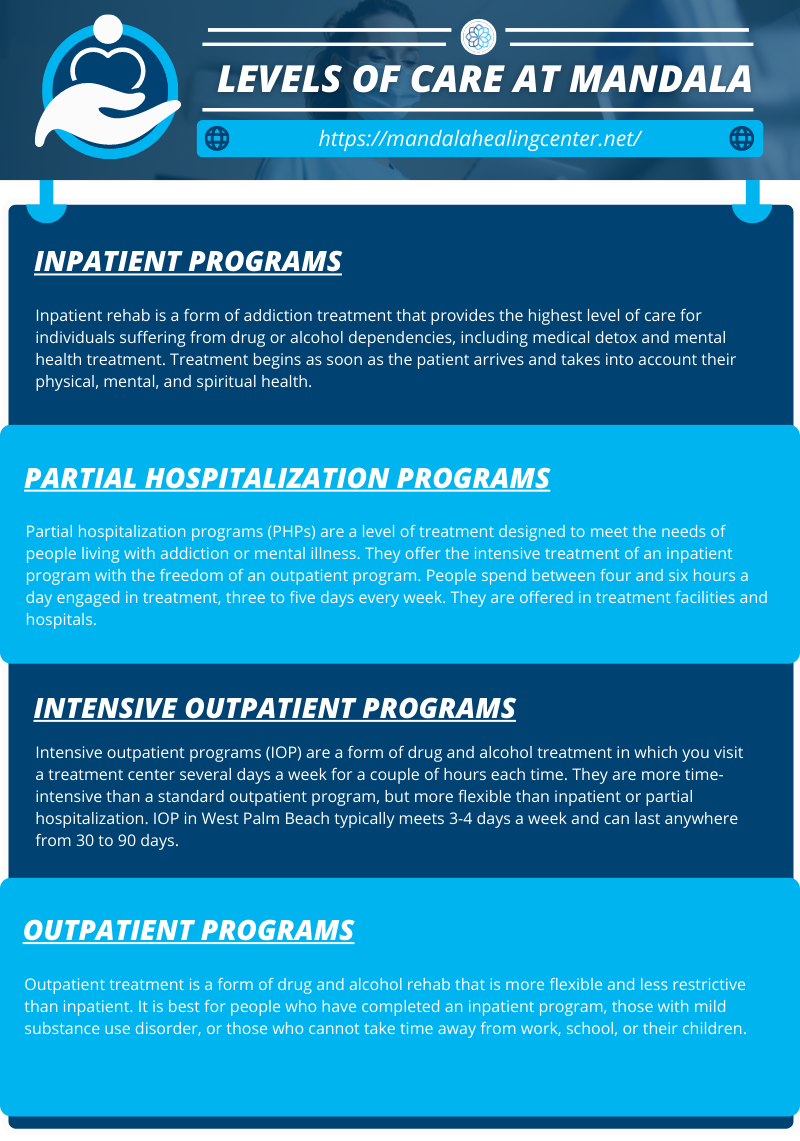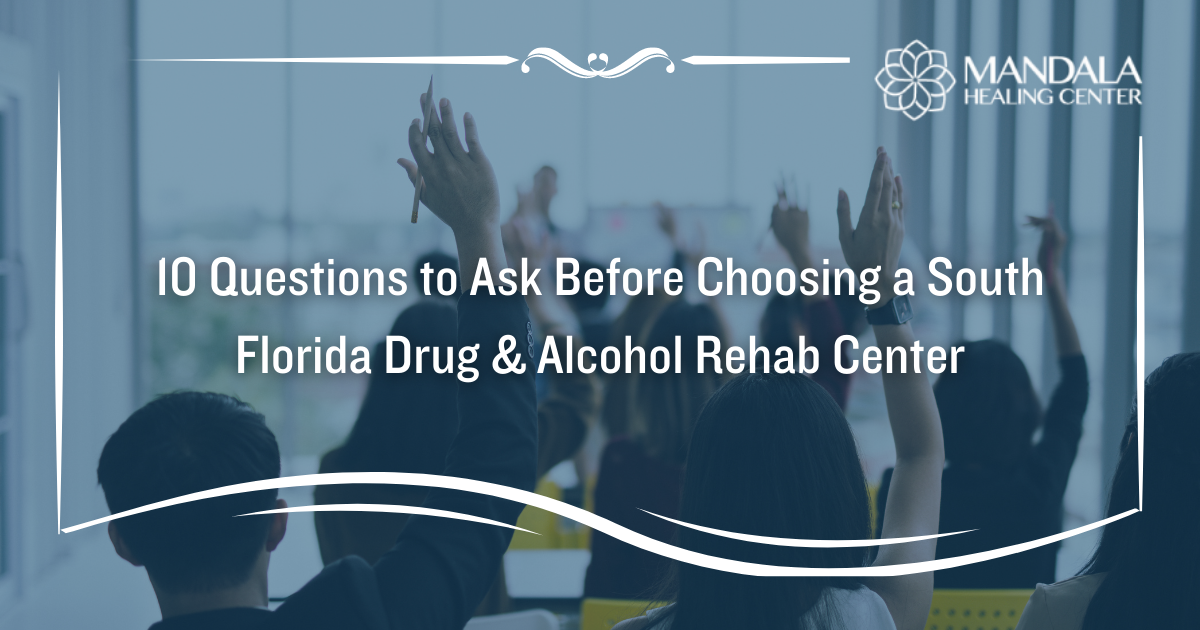With more than 100,000 drug overdose deaths happening annually, the difference between addiction and recovery means life or death. As a result, choosing the right drug and alcohol rehab center is more important than ever.
Finding the right addiction treatment center can be a challenging, yet essential step in the recovery process. But how do you know that you’re choosing the right one? Here are 10 important questions to ask before choosing a drug and alcohol rehab center in South Florida.
1. Is Your Addiction Treatment Program Licensed and Accredited?
First and foremost, you want to choose a high-quality rehab center that you feel you can trust. The best way to evaluate the integrity of a program is to verify that they are state-licensed and third-party accredited.
Third-party accreditation comes from either the Joint Commission (formerly JCAHO) or the Commission on Accreditation of Rehabilitation Facilities (CARF). Accreditation ensures that patient safety and evidence-based practices are the top priority of the treatment facility.
2. What Insurance Companies are In Your Network?
South Florida rehab centers can be expensive, but treatment is covered by insurance as long as your insurance provider is in-network. A drug and alcohol rehab center will only accept a handful of insurance plans, otherwise, treatment must be paid for out of pocket. Before you enroll in a treatment program, be sure to verify your insurance benefits with your insurance provider and the rehab facility.
3. What Levels of Care do you Offer?
Many drug and alcohol rehab centers in South Florida offer several levels of care, including:
- Drug and alcohol detox
- Inpatient
- Partial hospitalization (PHP)
- Intensive outpatient (IOP)
- Outpatient (OP)
Learning about the levels of care available to you will help make sure your needs are met and that you know what to expect during treatment.

4. What Happens When I Complete the Program?
Your recovery doesn’t stop when you complete a rehab program, and the best addiction treatment centers will offer aftercare support services that help guide you through early recovery. If a facility does not have any form of aftercare support, you may want to consider seeking treatment elsewhere.
Common examples of aftercare include:
- Sober living
- Alumni program
- Medication management
- Recovery coaching
- Mental health counseling
Participating in aftercare is in your best interest because rehab does not cure addiction–it gives you the skills, resources, and support you need to manage it.
5. Do You Use an Individualized Approach?
Everyone experiences addiction differently and has unique needs when it comes to treatment. As a result, the most effective treatment approaches aim to diagnose and treat your individual needs. Still, some treatment centers embrace a one-size-fits-all approach. Be sure to discuss the treatment approach the facility uses and make sure they can address your unique needs.
6. What Therapies Do You Use?
Learning about the therapies used will help you know what to expect during rehab and whether or not the program is right for you. The best addiction treatment centers in South Florida offer a combination of evidence-based and holistic therapies, including:
- Cognitive-behavioral therapy (CBT)
- Dialectical behavior therapy (DBT)
- Motivational Interviewing (MI)
- Contingency management (CM)
- Art, music, or drama therapy
- Massage, chiropractic, physical therapy, and/or acupuncture
- Nutrition, exercise, yoga, and meditation
7. What Kinds of Health Professionals Work at Your Facility?
Just like it’s important to verify the legitimacy of the facility as a whole, it’s also important to research the credentials and qualifications of the medical and clinical staff. Staff should involve:
- Medical doctors
- Nurses
- Psychiatrists
- Mental health specialists
- Social workers
- Nutritionists
- Substance abuse counselors
Each of these professionals should be licensed or certified in their respective specialties.
8. Do You Have Any Treatment Specialties?
Some addiction treatment centers have unique specialties that set them apart. For example, some facilities provide trauma-informed care that is best for people with PTSD or a history of trauma. Other programs specialize in dual diagnosis care for those with addiction and severe mental illness. It’s important to identify your needs and learn about the specialties rehab centers offer before making your decision.
9. Can My Family Visit Me During Rehab?
Family involvement is an important part of recovery because it can boost morale and reduce your risk for relapse. Many drug and alcohol rehab centers in South Florida offer family therapy and family workshops to provide support to everyone in the family unit. After all, addiction impacts everyone close to the person who is struggling. If a rehab center discourages family contact, this is a major red flag, and you may want to consider treatment elsewhere.
10. How Long Does Rehab Last?
For most people, addiction treatment lasts 30, 60, or 90 days. Longer treatment stays are associated with better treatment outcomes, but everyone is different. The best rehab centers may not be able to give you an exact timeline because they base your treatment duration on the progress you make during treatment, not discharging you until you are entirely ready to navigate recovery on your own. Still, it’s nice to have an idea of what to expect so you can prepare and pack appropriately.
Start Your Recovery Today
Mandala Healing Center is a licensed and accredited addiction detox and treatment center located in West Palm Beach, FL. Using a holistic approach and individualized care, we help each of our clients heal their minds, bodies, and spirits after addiction. If you or a loved one are ready to start your recovery or have any questions about our South Florida drug and alcohol rehab center, please contact us today. Our admissions counselors are always available to help.
References:












